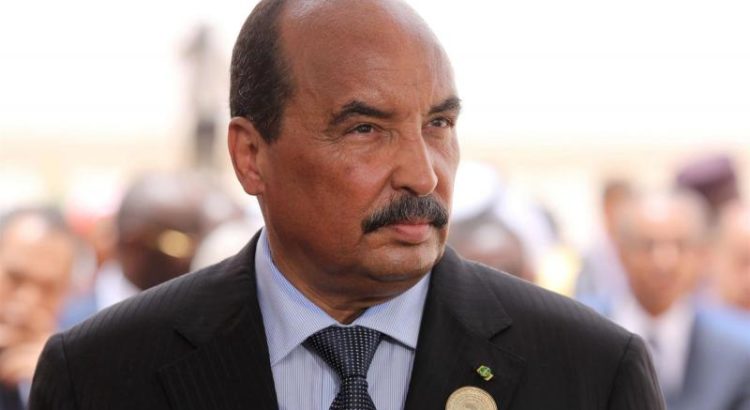Africa/Mauritania/01.10.2018/By Lamine Ghanmi/Source: thearabweekly.com.
The closures came after Ould Abdel Aziz spoke critically of political Islam, saying it has done more harm to Arab countries than the state of Israel.
Authorities shut down an Islamic university and an Islamic training centre linked to a prominent Muslim Brotherhood preacher as part of Mauritanian President Mohamed Ould Abdel Aziz’s crackdown on Islamist extremism.
Mauritania’s High Education Ministry ordered the closure of Abdallah ibn Yassine University, headed by Islamic fundamentalist preacher Muhammad al-Hassan Ould al-Dadou, who is a member of the Muslim Brotherhood-affiliated International Union for Muslim Scholars.
The move came three days after the government outlawed the Islamic Scholars Training Centre, also run by Ould al-Dadou. Analysts speculated that the government could next ban the Muslim Brotherhood-affiliated political party in the country.
The closures came after Ould Abdel Aziz spoke critically of political Islam during a September 22 news conference, saying it has done more harm to Arab countries than the state of Israel.
Asked about the government’s position on the country’s Muslim Brotherhood affiliate, the National Rally for Development and Reform, also known as Tewassoul, Ould Abdel Aziz said: “One thing at a time. We are live on the air.”
Tewassoul was the main opposition to the president’s ruling Union for the Republic (UPR) party and has one of the most loyal support bases in the country.
Following Ould Abdel Aziz’s remarks, Muslim Brotherhood activists attacked the president on social media, with some calling him a “five-star shibiha,” a reference to the Syrian state-sponsored militia that assisted government troops in cracking down on its opponents.
Ould al-Dadou responded to Ould Abdel Aziz with a sermon defending Islamists in the region and charged Ould Abdel Aziz and other Arab regimes with “injustice and despotism.”
Ould al-Dadou’s sermon went viral on social media and the next day the government announced it would shut down the imam’s training centre.
Ould Adel Aziz has led a charge against Islamists since the run-up to his country’s parliamentary, regional and municipal elections in September. During one rally, he charged that “proponents of political Islam are all extremists… Activists of the political Islamist parties are extremists. They take up weapons when they fail to achieve their objectives and goals by political ways.”
In separate remarks, Ould Abdel Aziz blamed Muslim Brotherhood-linked parties and other Islamists for causing “the ruin and destruction of nations wealthier and stronger than Mauritania.”
“We must block the route to them. We must shut the door before them in the elections to shield our nation and protect our society,” he said.
Ould Abdel Aziz’s fiery campaign against Islamists is credited with helping the UPR secure a large majority in parliament, regional councils and municipalities.
Analysts said the president’s continued attacks on Islamists, even after their poor performance in elections, could be part of a plan to outlaw the group.
Tewassoul leader Mohamed Mahmoud Ould al Sidi said in a statement that talk of outlawing the party was part of an attempt to pave the way for the president to secure a third mandate in office, which would require changing the constitution.
While Ould Abdel Aziz has ruled himself out of elections next year, he has vowed to leave office protecting the “achievements” of his administration and his critics suspect he could be angling for another term.
Ould al Sidi said: “We refuse to be neutral in the fight against a third mandate and for the respect of the constitution.”
Addressing Ould Abdel Aziz’s criticism, he said: “We follow a path of moderation and middle ground but we refuse to abandon our Islamic references and vision,” adding that the Mauritanian authorities failed to present evidence suggesting his party was involved in extremism.
“They are extrapolating the reality of other Islamists upon us. It is better for them to give proof and facts to back their accusations,” he said. “The difference between us and the others is that we are inspired by Islamic values in our political activities while others are exploiting Islam for their political benefit.”
The closed Islamic training centre denied authorities’ claims that it was linked to extremism, saying the institution “contributes to cementing societal peace in Mauritania, in the region and elsewhere in the world by teaching moderate Islam.”
However, the National Union of Mauritania’s Imams and the League of Mauritania’s Islamic Scholars supported the closure, saying that “these centres have not succeeded in graduating a single scholar since they were opened many years ago.”
They warned against any violent reactions to the ban, saying that “religion forbids any reckless action that would cause strife and undermine peace.”
Pro-government intellectuals urged authorities to ban Tewassoul and its civic associations.
“Genuine Mauritanian political parties belong to the homeland with ideas and organisations in contrast to the front windows of the clandestine organisation of the Muslim Brotherhood that takes advantage of our democracy,” said political writer Ishaak al-Kounti. “These windows have no place in our political map. The solution is to ban them.”
Source of the notice: https://thearabweekly.com/new-measures-fuel-speculation-about-islamist-ban-mauritania






 Users Today : 29
Users Today : 29 Total Users : 35460046
Total Users : 35460046 Views Today : 42
Views Today : 42 Total views : 3418673
Total views : 3418673